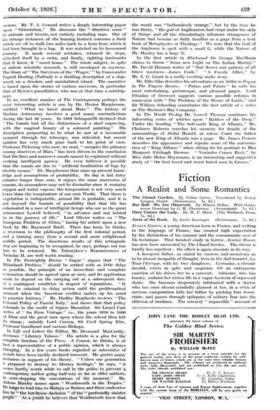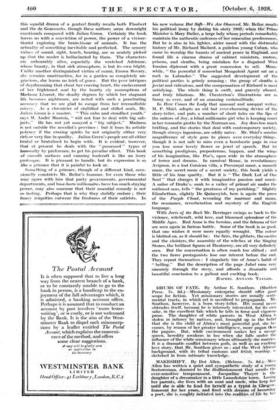Fiction
A Realist and Some Romantics
The Closed Garden. By Julian Green. 'Translated by Henry Longan Stuart. (Heinemann. 7s. 6d.) But Soft—We Are Observed. By Hilaire Bellew. With thirty.
7s. 6d.)
Joris of the Rock. By Leslie Barringer. (Heinemann. 7s. 6d.) JULIAN. GREEN, a young American born in France, and writing in the language of France, has created high expectation by the distinction of his manner and the consummate ease of his technique. That finished study in horror, Avarice House, has now been succeeded by The Closed Garden. The theme is hardly less repellent : the -effect is again absolute in its way. A bourgeois father, so staled by custom and monotony as
to be almost incapable of thought, lives in the dull townlet, La Tour l'Eveque, with his two daughters. Germaine, a chronic
invalid, exists in spite and suspicion till an outrageous exaction of his drives her to a convent. Adrienne, who has beauty, endures her airless life in a vague hysteria of repressed desire. She becomes desperately infatuated with' a doctor who has once absent-mindedly glanced at her, 'in a crisis Of nervous exasperation kills her father by pushing him down- stairs, and passes through epilepsies of solitary fear into the oblivion of inadrieSS. The serenely " impassible " account of this squalid drama of a genteel family recalls both Flaubert and the de Goricourts; though-these authors . saem downright ornotionals compared with Julian Green. Certainly the book.. leaves us with a conviction of power, the power of a vivisee-: tionist exploring the brain-tissue of -animals. It has the actuality of something inevitable and perfected. The sensory. values of sound, sight, touch, hearing, are so acutely picked - upthat the reader is hallucinated by them. The characters are unbearably alive, especially the wretched Adrienne,, whose beauty, in that sick atmosphere, is but its own blight, Unlike another distinguished victim of ennui, Emma Bovary, she remains unattractive, for in a garden so completely un- gracious, she learns no trick of grace. But the poor intrigues of daydreaming that cheat her craving. heart, the enslavement of her frightened soul by the hearty sly assumptions of- Madame Lesurat, the deadly degrees by which her stagnant life becomes nightmare, are noted with such a penetrating accuracy that we are glad to escape from her irremediable misery. As a chronicler of stultified and stifled souls, Mr., Julian Green is a master: - " This calm and steadfast youth," says M. Andre Maurois, " will not fear to deal with big sub--. jects." He has not yet assayed a " big subject." Madness is not outside -the novelist's province-; but it loses its artistic potency if the crazing spirits he not originally either very: rich or very fine in quality. Julian Green's people are all either. brutal or brutalized to begin with. It is evident, however,, that at present he deals with the ".possessed " types of humanity- by preference, to get his peculiar effect. This book of smooth surfaces and cunning toolcraft is like an ivory grotesque. It is pleasant to handle, but its expression is so like a grimace that it is painful to look at.
Something of a grimace, though of a different kind, occa7 sionally constricts Mr. Belloc's humour, for even those who may agree with him that party governments, governmental departments, and base-born millionaires have too much staying power, may also murmur that their essential comedy is not so lasting. Perhaps that is why they stolidly endure ; their, hoary iniquities outwear the freshness of their satirists. In his new volume But Soft---We Are Observed, Mr. Belloc xesalts his political irony by dating his .story.1937.;: whenthe' Prime Minister is Mary Buller, a large lady whose periodS remarkably maintain the authentic. cadences of-her masculine predecessors. But he is also in his lighter, airier mood with the distressful history of Mr. RichardMallard, a guileless young Cuban, who came to worship the haunts of ancient peace in England, and found life a cinema drama of cabinet ministers, motors, prisons, and sleuths, being mistaken for a disguised West Iranian diplomat with a great concession •to sell. . Mean- while, " the powerful if somewhat Mongoloid Agent sat on a rock - in Labrador." The suggested development of the political parties is grimly amusing ; the group of . sleuths is jovial and ridiculous, and -the compensation of Richard is most satisfying.. The whole thing is swift, and gravely absurd, and truly hilarious. Mr. Chesterton's illustrations are as funny as ever, and of an amazing verisimilitude. • In Here Conies the Lady that unusual and unequal writer, M. P. Shiel, adopts an old but ever-charming devices of the story-teller, and puts a number of short tales on the- lips of the suitors of -Joy, a blind millionaire girl whO is keeping court in her romantic grotto by the NorMan sea. Joy does too much bridling, and the stories that deal with contemporary society, though always ingenious, are oddly naive. Mr. Shiers sombre magnificence of style goes to pieces over everyday-things, though it is not safe 1.6 miss even a in .bobastic page in 'ease you lose some lovely floWer or jewel of sPeech. But let something prodigious, preposterous, happen; and the wings of his imagination, like Poe's, open wide in the atmosphere of terror and drearhs. -In carnival Rome, in revolutionary Avignon, in a lost Corsican villa, a Provencal moor, a moonlit maze, the secret room of a secret society, this book yields a little of his true quality. But it is " The Dark Lot of One Soul " that charges it with imaginative passion and music. A sailor of Drake's, sunk to a valley of primal air under the midmost seas, tells " the greatness of my perishing." Slightly Elizabethan, slightly De Quinceyish, here is again the prose of the Purple Cloud, revealing the murmur and moan, the resonance, reverberation and• mystery • of the English language. • With Joris of the Rock Mr. - Derringer swings us- back to the violence, witchcraft, wild love, and• blazoned splendour of the Middle Ages. Red Anne is the heroine, and the falcons of Ger are seen again in furious battle. Some of the book is so good, that one wishes it were _ more equally wrought. The colour is blotted on, as it should be ; the fairs, the gibbets, the castles and the cloisters, the assembly of the witches at the Singing Stones, the brilliant figures at Hautarroy, are all very definitely seen. But the conversation is often much too stilted ; and the two fierce protagonists lose our interest before the end. They repeat themselves : I singularly tire of Anne's habit of ". belling." But the description of the page Juhel runs very sincerely through the story, and affords a dramatic and beautiful conclusion to a gallant and exciting book. - RACHEL ANNAND TAYLOR.























































 Previous page
Previous page